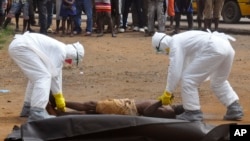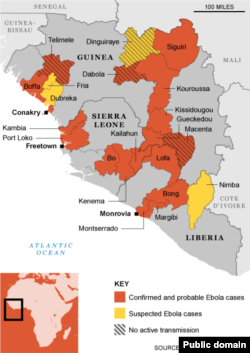The United Nations Children’s Fund reports the Ebola crisis in Liberia is having a devastating health, psychological, and social impact on children. UNICEF warns the deadly Ebola outbreak is threatening to wipe out all of the hard-earned gains for children in the country.
When Liberia emerged from years of civil war in 2003, the under-five child mortality rate stood at 110 per 1,000 live births. The U.N. Children’s Fund reports that number decreased to 75 per 1,000 live births by 2012 -- though still the highest rate of decline in child mortality in Africa.
That is only one of a number of gains made in children’s health that UNICEF says is now threatened by the historic Ebola crisis raging throughout the country. The U.N. agency reports Ebola has severely disrupted the country's health system. As a consequence, it says, children are once again dying from measles and other vaccine preventable diseases.
It notes Ebola patients occupy most of the available hospital beds, leaving few places for women to safely deliver their babies.
UNICEF Crisis Communications Chief Sarah Crowe is currently on a mission in Liberia. Speaking by telephone from the capital Monrovia, she told journalists in Geneva the impact of the Ebola crisis upon children is very grave.
“Children are seeing their family members and relatives are taken away by people effectively in astronaut suits looking like crop sprayers. And the affect of this is deeply distressing for children. Children who have been exposed to the virus are facing deep stigma and nobody wants to take them on because there is this terrible psychosis of fear around the Ebola virus,” she said.
Many children have lost one or two parents to this disease. Crowe said UNICEF is looking for innovative ways to give orphaned and other Ebola-affected children the care, nurture and attention they need. One method, she said is to have people who have survived Ebola look out for these children during the critical 21-day incubation period.
It is raining heavily in Liberia right now. Crowe said children throughout the rainy season will be exposed to high levels of malaria, pneumonia and diarrhea.
“If children are not getting the attention they need, this will also affect malnutrition in the longer term. Schools are closed, so children are living in this sort of twilight zone where they know they are not able to touch and play with others as they used to," said Crowe. "But, of course, they are children and they do.”
UNICEF reports children account for 22 percent of Ebola cases, men 25 percent, and women more than 50 percent. The Liberian Ministry of Health reports 75 percent of Ebola deaths are among women.
Health officials note that women are the main caregivers in their family. So they are particularly vulnerable to becoming infected and die from the disease.
Latest World Health Organization estimates put the number of Ebola cases at 4,784, with 2,400 deaths, nearly half in Liberia. WHO says these figures are most certainly underestimated.






